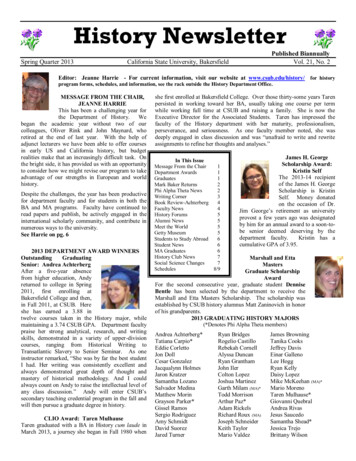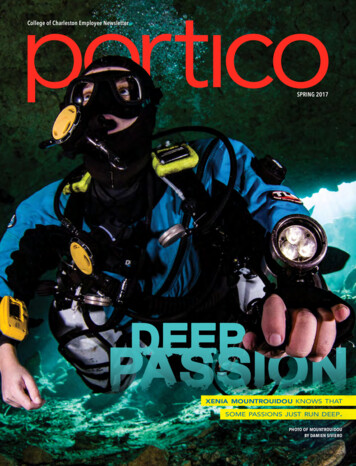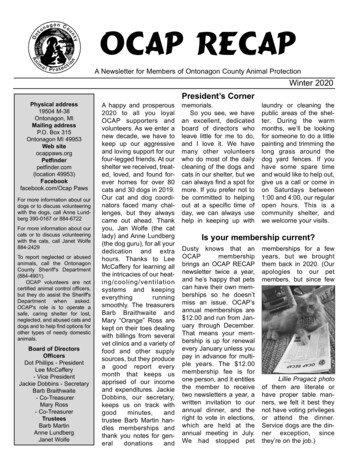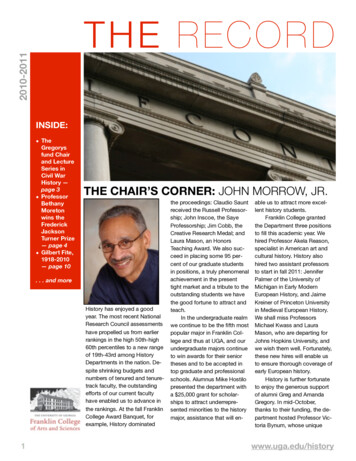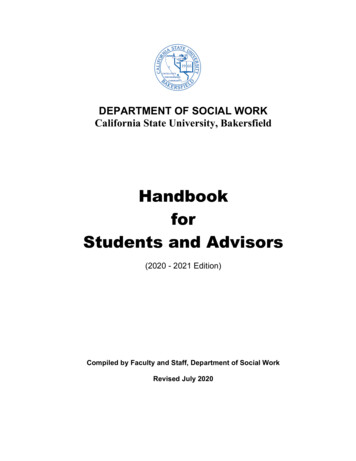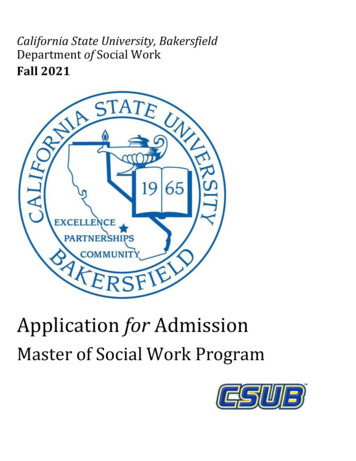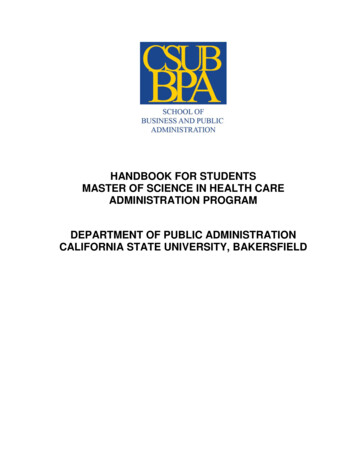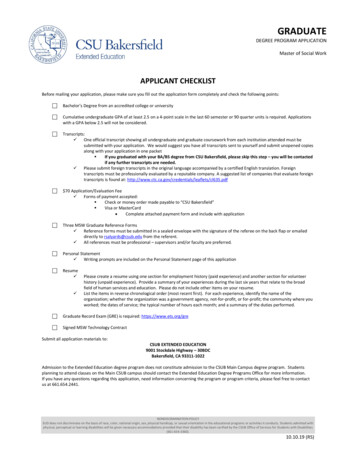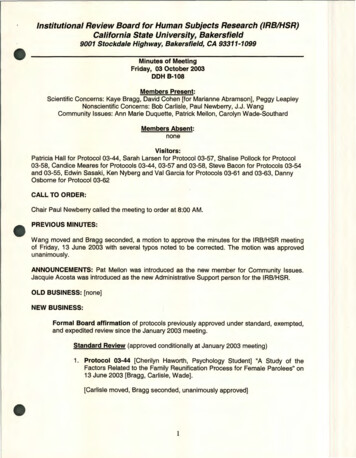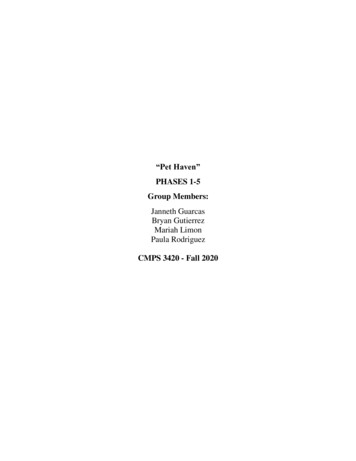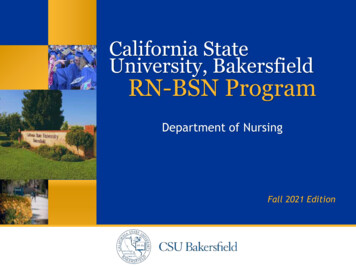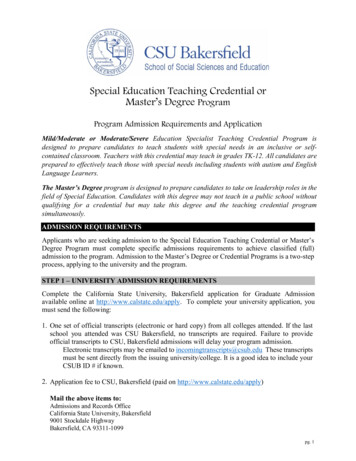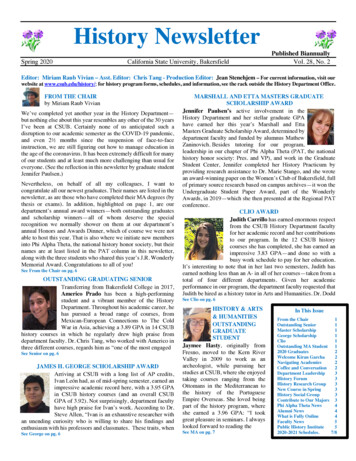
Transcription
History NewsletterSpring 2020California State University, BakersfieldPublished BiannuallyVol. 28, No. 2Editor: Miriam Raub Vivian – Asst. Editor: Chris Tang - Production Editor: Jean Stenehjem – For current information, visit ourwebsite at www.csub.edu/history/; for history program forms, schedules, and information, see the rack outside the History Department Office.FROM THE CHAIRby Miriam Raub VivianWe’ve completed yet another year in the History Department—but nothing else about this year resembles any other of the 30 yearsI’ve been at CSUB. Certainly none of us anticipated such adisruption to our academic semester as the COVID-19 pandemic,and even 2½ months since the suspension of face-to-faceinstruction, we are still figuring out how to manage education inthe age of the coronavirus. It has been extremely difficult for manyof our students and at least much more challenging than usual foreveryone. (See the reflection in this newsletter by graduate studentJennifer Paulsen.)Nevertheless, on behalf of all my colleagues, I want tocongratulate all our newest graduates. Their names are listed in thenewsletter, as are those who have completed their MA degrees (bythesis or exams). In addition, highlighted on page 1, are ourdepartment’s annual award winners—both outstanding graduatesand scholarship winners—all of whom deserve the specialrecognition we normally shower on them at our department’sannual Honors and Awards Dinner, which of course we were notable to host this year. That is also where we initiate new membersinto Phi Alpha Theta, the national history honor society, but theirnames are at least listed in the PAT column in this newsletter,along with the three students who shared this year’s J.R. WonderlyMemorial Award. Congratulations to all of you!See From the Chair on pg. 6OUTSTANDING GRADUATING SENIORTransferring from Bakersfield College in 2017,Americo Prado has been a high-performingstudent and a vibrant member of the HistoryDepartment. Throughout his academic career, hehas pursued a broad range of courses, fromMexican-European Connections to The ColdWar in Asia, achieving a 3.89 GPA in 14 CSUBhistory courses in which he regularly drew high praise fromdepartment faculty. Dr. Chris Tang, who worked with Americo inthree different courses, regards him as “one of the most engagedSee Senior on pg. 6JAMES H. GEORGE SCHOLARSHIP AWARDArriving at CSUB with a long list of AP credits,Ivan León had, as of mid-spring semester, earned animpressive academic record here, with a 3.95 GPAin CSUB history courses (and an overall CSUBGPA of 3.92). Not surprisingly, department facultyhave high praise for Ivan’s work. According to Dr.Steve Allen, “Ivan is an exhaustive researcher withan unending curiosity who is willing to share his findings andenthusiasm with his professors and classmates. These traits, whenSee George on pg. 6MARSHALL AND ETTA MASTERS GRADUATESCHOLARSHIP AWARDJennifer Paulsen’s active involvement in theHistory Department and her stellar graduate GPAhave earned her this year’s Marshall and EttaMasters Graduate Scholarship Award, determined bydepartment faculty and funded by alumnus MathewZaninovich. Besides tutoring for our program,leadership in our chapter of Phi Alpha Theta (PAT, the nationalhistory honor society: Pres. and VP), and work in the GraduateStudent Center, Jennifer completed her History Practicum byproviding research assistance to Dr. Marie Stango, and she wrotean award-winning paper on the Women’s Club of Bakersfield, fullof primary source research based on campus archives—it won theUndergraduate Student Paper Award, part of the WonderlyAwards, in 2019—which she then presented at the Regional PATconference.CLIO AWARDJudith Carrillo has earned enormous respectfrom the CSUB History Department facultyfor her academic record and her contributionsto our program. In the 12 CSUB historycourses she has completed, she has earned animpressive 3.83 GPA—and done so with abusy work schedule to pay for her education.It’s interesting to note that in her last two semesters, Judith hasearned nothing less than an A- in all of her courses—taken from atotal of four different departments. Given her academicperformance in our program, the department faculty requested thatJudith be hired as a history tutor in Arts and Humanities. Dr. DoddSee Clio on pg. 6HISTORY & ARTS& HUMANITIESOUTSTANDINGGRADUATESTUDENTJaymee Hasty, originally fromFresno, moved to the Kern RiverValley in 2009 to work as anarcheologist, while pursuing herstudies at CSUB, where she enjoyedtaking courses ranging from theOttomans in the Mediterranean tothe history of the PortugueseEmpire Overseas. She loved beingpart of the history program, whereshe earned a 3.96 GPA: “I tookgreat pleasure in seminars. I alwayslooked forward to reading theSee MA on pg. 7In This IssueFrom the Chair1Outstanding Senior1Master Scholarship1George Scholarship1Clio1Outstanding MA Student12020 Graduates2Welcome Kiran Garcha2Navigating Academics2Coffee and Conversation2Department Leadership3History Forum3History Research Group3New Course in Spring3History Social Group3Contribute to Our Majors 3Phi Alpha Theta News4Alumni News4What is Fully Online4Faculty News5Public History Institute52020-2021 Schedules.7/8
CONGRATUALATIONS TO THE GRADUATES OF 2020!*denotes Phi Alpha Theta Honor Society memberMoises Aguas Janet Angel Jasmine ArmstrongSelestino BautistaAmanda Brummer(MA)* Dominic CaccameseMarcussen CamarenaLizeth Carbajal Judith Carrillo* John Celis Nataly Cortez* DanielCrisanto Donato Cruz(MA)* Christian Cuevas Eileen Diaz* Gary DiazJosh Dunbach Tyler Evans Scott Ezell* Robert Greenwood Ana GuevaraJaymee Hasty(MA) Claris Herrera Elliott Hopkins* Emily JohnstonMason Ladd Catalina Lemus Drew Medeiros Calloway Morphis TrevorMurg Valeria Padilla Carolina Perez-Arroyo Charlie Perreault AmericoPrado* Angel Ramirez* Jose Ramirez Jeffrey Ramos Myrna Reyna*Paula Reynal* Theodiseus Rodriquez Brittany Stank* Lorenzo VargasTristan Weiser*GRADUATE PROGRAM DEGREES: CONGRATULATIONS!Amanda Brummer passed her comprehensive examinations.Donato Cruz completed his thesis, “'America’s Newest City': 1950s Bakersfieldand the Making of the Modern Suburban Segregated Landscape.”Jaymee Hasty completed her thesis, “In the Heart of the City: Prostitution andMoral Reform of Bakersfield's Red-Light District in the Progressive Era."WELCOME TO KIRAN GARCHA!The CSUB History Department will welcome its newest member this fallsemester with the arrival of Kiran Garcha, a specialist in AfricanAmerican History. She will be completing her doctoral dissertation(PhD) early this summer before joining our faculty in August. Originallyfrom California, as an adolescent Ms. Garcha moved with her family toWashington state, where she eventually attended the University of Washington inSeattle, completing a BA in American Ethnic Studies there. She then moved backto California to pursue an MA degree at UCLA in Afro-American Studies, beforefinally landing at UC Santa Cruz for, first, a second MA, this one in History, andthen a PhD. Her dissertation is now nearing completion: “Bringing the VanguardHome: The Role of Children, Home, and Family in the Black Panther Party.”While working on her doctorate, Ms. Garcha was also able to publish some of herscholarship, including an article in the Journal of African American Studies in2019 (September, pp. 1-15): “Children and Childhood in Black Panther Thoughtand Discourse, 1966-1974.”Last fall, Ms. Garcha was hired to teach African American Life and History atCSU Monterey Bay, and served as a Teaching Assistant at UCSC for sixteendifferent courses, giving her several years of pedagogical experience in a broadrange of courses, in addition to African American history, including the U.S.history survey, immigration history, U.S. labor history, the Civil RightsMovement in the U.S., and historical skills and methods, among others.In addition, Ms. Gracha participated in a summer residency program in the ChapelHill area (the Research Triangle) of North Carolina, last summer: “Objects andPlaces in an Inquiry-Based Classroom: Teaching, Learning, and Research in theHumanities.” She also has experience in digital humanities, having helped builda digital public humanities map as a California Humanities Mellon Public Fellowin 2018, as well as in museum/library exhibition work, as she co-curated “Picturesin Progress: The Black Panther, 1966-2016,” a McHenry Library Exhibition atUCSC. To round out her research and pedagogical skills, Ms. Garcha alsoparticipated in the Advanced Oral History Summer Institute at the Oral HistoryCenter at the Bancroft Library at UC Berkeley.We are sorry that we will not all be together on campus this fall to welcome KiranGarcha in person. Students will at least be able to take a course with her, one ofwhich will be in her field of specialization: HIST 4230, African AmericanHistory. And we HOPE that everyone will have a chance to meet her on campuswhen the spring semester opens in January.Welcome to the History Department, soon-to-be Dr. Garcha!NAVIGATING ACADEMICS DURINGTHE PANDEMIC(Thoughts by Jennifer Paulsen, expressed in agraduate reading seminar reflection paper)One way this course challenged me had nothing todo with the course itself. It was the ongoingpandemic that held me and my colleagues mentallyhostage. The state’s stay-at-home orders were ashock to our system, and it was frightening to seethe world change so quickly. I was working in theGraduate Student Center when we received theorder that we would be leaving the campus and notcoming back until further notice, and the worry inthe air could be felt. That is the worry that we havebeen carrying through this semester. We haveworried about our families and we have worriedabout providing for them. I am thankful to havebeen able to work from home for tutoring and theGSC, but I am still filled with worry. With theclosure of the public schools as well, I was nowsuddenly my son’s teacher, and he had a lot ofquestions about what was happening to the world.It has been a difficult balance managing the newstresses and anxieties presented during theCOVID-19 Pandemic, and it resulted in a shift inmy ability to learn.For the latter portion of the semester, I tried to findquiet times to study. It was impossible. Even if myson was busy with a game or watching tv, my brainwas still processing what was going on. I spokewith several of my classmates, and they shared thesame feelings. They were also stressed, and theysaid it was impossible to study. This experiencehas, however, reminded me of the importance ofthe classroom setting. As a student, I value beingable to spend time with my colleagues, and I missthe conversations with my professors. We wouldgive anything to be worried about finding parking.This is a semester to remember, but it has affordedme a new perspective on how learningenvironments can be easily disrupted. Our learningenvironments are much more than showing up toclass. We rely on each other to get through thesemester and to make our discussions meaningful.I feel as though we took the classroom communityfor granted, but now we will have a newappreciation for it, as students and as future/currenteducators.COFFEE AND CONVERSATIONCoffee and Conversation will, unfortunately, notbe meeting face-to-face in Fall 2020 due to theCOVID-19 Pandemic. Dr. Wempe is looking intoalternative options and will contact history majorsvia email if a virtual substitute, perhaps via Zoom,can be offered. No dates are yet reserved, but if wedo go online with them, all of the events willobviously be “BYOT&C: Bring Your Own Tea &Coffee.”2
DEPARTMENT LEADERSHIP ANNOUNCEMENTAlthough Prof. Miriam Raub Vivian has completed her 3-yearterm as Chair of History, the department voted to have hercontinue for a second (and final) term, ending in spring 2023. Shewill be on sabbatical in spring 2021, so another member of thedepartment will step in to handle chair duties during that semester.She will handle most department business this summer (JeanStenehjem, or Administrative Support Coordinator, will be off forthe summer), so please email her at mvivian@csub.edu about ourprogram, advising, etc.Douglas Dodd, history graduate program director since 2007,whom we thank for his many years of steady service in thisposition, has stepped down this Spring. Prof. Stephen Allen willassume the role of graduate program director in Fall. Inquiriesabout our M.A. program should now be directedto sallen13@csub.edu.Prof. Alicia Rodriquez has a new position as well, though it is notin our department: she has since early this calendar year been thenew Faculty Director of Interdisciplinary Studies for theuniversity. She manages that program, which includes revivingseveral interdisciplinary minors as well, such as Asian Studies,and Latin American Studies.HISTORY FORUMOn February 21, 2020, the History Forum welcomedour very own Dr. Sean Wempe, whose talk wasdrawn from his recent book, Revenants of theGerman Empire: Colonial Germans, Imperialism,and the League of Nations (Oxford University Press,2019), which challenges and expands simplified narratives ofGerman involvement in international organizations and diplomacyin the interwar period by taking a fresh perspective on Germaninvestment in the League of Nations Mandate System framework.Many Germans remained invested in German imperialism andsought to rebuild their status on the international stage. TheHistory Forum committee is extremely proud to have been able tohighlight the research of a member of the Department of Historyat CSUB. One student attendee applauded Wempe’s “clear andconcise” presentation style that kept him deeply engaged and“intrigued” during the talk. Another student valued Wempe’sdiscussion of his impressive archival work. The talk was wellattended, and Wempe lectured to a full room of students, faculty,and members of the campus community. The committee looksforward to inviting him back soon.Due to the global pandemic, the History Forum committeepostponed the second History Forum talk of the semester. Dr.Edward J. Watts (UC San Diego) was scheduled to offer a lecturedrawn from his new book, Mortal Republic: How Rome Fell intoTyranny (Basic Books, 2018). We look forward to hearing aboutWatts’s fascinating research in a future History Forum talk.Missing the opportunity to visit museums in Southern California? TheGetty has put its collection and some exhibits online. To access these,start with https://www.getty.edu/visit/, and scroll down for options.Many internationally acclaimed museums are now offering freeexploration of their collections online, so if you fancy exploring one, goto their website and check out what opportunities await the armchairvisitor. Or check out this website, which lists 12 major museums offeringvirtual tours. msgalleries/museums-with-virtual-tours.HISTORY RESEARCH GROUPThe History Department’s Historical Research Group (HRG),which offers a platform for attendees to present their research andreceive feedback from the group, met to discuss the latest bookproject of Dr. Mustafa Dhada on Friday, April 3, at 3 p.m., overZoom. Attendees sipped cocktails, beer, and coffee from theirown backyards, home offices, and kitchen tables while debatingtitles, discussing proposed chapter outlines, and considering whowould be the ideal audience for his book. This was the firstmeeting of the HRG held on Zoom, and it was a great success. TheHRG will continue to meet and support one another’s research inthe fall term, even if we cannot meet in person.NEW COURSE IN SPRING 2021The history department has yet another new, general educationcourse that will be offered next academic year—HIST 2208, God,Sex, and Revolution: The Joy of History. This course is a mixedmedia exploration of human behavior in history that guidesstudents in cultivating and maintaining a lifelong appreciation ofthe human past, with an emphasis on past societies and socialrelationships. Using less academic and more popular forms ofhistory—e.g., novels, films, biographies, graphic novels, podcasts,blogs, documentaries, and television programs—this coursefurther offers students the tools and skills to identify reliablesources of information and helps them develop a criticalawareness of the public sphere, creating more informed andengaged citizens eager to participate in public life. It satisfies theSELF requirement of GE. Dr. Wempe will be the first to teach thisnew course. Look for HIST 2208 when you enroll for Spring 2021.HISTORY SOCIAL GROUPHistory Social Group had its last meetingof the 2019-20 academic year the nightbefore campus announced the transitionto online for the remainder of the Spring semester. Fun was hadby all at what will likely be the last pizza and board game night forquite some time. Settlers of Catan was played. Dr. Wempe isexceptionally wily and won that board game. He is, for themoment, the reigning champion of the Social Group board gamenights. With the transition to online teaching in Fall 2020, noHistory Social Group meetings are currently scheduled for thatterm. Dr. Wempe is looking into alternative ways to host the boardgame nights by virtual means and will be in contact via email if hefinds a feasible option, though he is jokingly toying with the ideaof just holding on to the title of reigning champion as long aspossible before the next rematch.CONTRIBUTE TO SUPPORT OUR MAJORSThe History Department recently created a fund with the CSUBFoundation. Contributions are tax deductible and will be used tohelp develop and support student activities. If you are interestedin contributing, please make your check out to “CSUBFoundation,” and put “A&H History, TR127” on the memo lineof the check. Then mail it to CSUB Foundation, 9001 StockdaleHighway, 19 AW, Bakersfield, CA 93311-1022.3
PHI ALPHA THETA NEWSby Miriam Raub Vivian, Psi-Zeta Chapter AdvisorThis has certainly been an unusual semester, and Phi Alpha Theta has not escaped theimpact of the coronavirus. The annual Regional Student Paper Conference, to be held atChapman University in April, was cancelled, and we were unable to hold our annualdepartment Honors and Awards Dinner, during which we recognize our class of PATinitiates joining our chapter of the national history honor society. It HAD been scheduledfor May 2. By NEXT spring, 2021, I am hopeful that such gatherings will once again bepossible. So, I urge all members and potential members to consider participating in theannual Regional Student Paper Conference, especially by presenting a research paper(maximum 10 pages—you can pare down a longer one) on which you’ve earned someform of an A. The deadline for submission of papers is usually sometime in March. I’llpost the Call for Papers for the spring 2021 conference once I receive it early in thespring semester, but feel free to contact me for more information about this terrificexperience for both undergraduate and graduate students.Although we were unable to host the department’s annual Honors and Awards Dinner,we had 9 undergraduates join our chapter (Psi-Zeta) of Phi Alpha Theta this academicyear, with their initiation date recognized by the national office as May 2, 2020; theirmember certificates will bear that date, once the national office is able to process them.Congratulations to our newest members: Judith Carrillo, Nataly Cortez, Eileen Diaz,Monica Gonzalez, Kayla Hinkle, Ana Ramirez, Angel Ramirez, Yadira Ramirez,and Tristan Wieser.Congratulations to others whom the department would have recognized on May 2,including Michael O’Neill, who was awarded a research grant by the Office of the Dean(for archival work in New England), as well as our annual department awardees:Americo Prado, Outstanding Graduating Senior Award; Judith Carrillo, Clio Award;Ivan León, James H. George Scholarship Award; Jaymee Hasty, Outstanding GraduateStudent Award; and Jennifer Paulsen, Marshall and Etta Masters Graduate Sc
from the CSUB History Department faculty for her academic record and her contributions to our program. In the 12 CSUB history courses she has completed, she has earned an impressive 3.83 GPA—and done so with a busy work schedule to pay for her education. It’s inter
